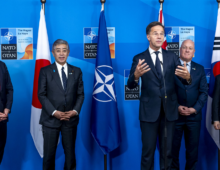South Korea is extending its fuel tax reduction through the end of the year in response to economic concerns sparked by the Israel-Hamas conflict, as announced by Finance Minister Choo Kyung-ho. The extension maintains a 25% discount on gasoline and a 37% reduction on diesel consumption, initially slated to conclude in October. The decision comes amid apprehensions of escalating oil prices, potentially triggering increased volatility in various economic sectors. This initiative is part of broader efforts to control domestic price levels and maintain public economic stability, which include intensified inspections to prevent unwarranted price hikes. This policy response coincides with significant upticks in global oil prices, highlighted by a more than 5% surge in U.S. West Texas Intermediate crude and Brent crude futures, marking their most substantial daily increases in more than six months.
The ongoing conflict in the Middle East presents specific economic risks for South Korea, given its substantial reliance on energy imports, particularly from the Middle East—a region accounting for 67% of its crude oil and 37% of its total gas imports. Although there have been no immediate disruptions in energy supplies, there’s a latent risk of broader conflict implications on Middle Eastern energy production and, consequently, global supplies, considering the region’s substantial share in the worldwide seaborne oil trade.
South Korea is extending its fuel tax reduction through the end of the year in response to economic concerns sparked by the Israel-Hamas conflict, as announced by Finance Minister Choo Kyung-ho. The extension maintains a 25% discount on gasoline and a 37% reduction on diesel consumption, initially slated to conclude in October. The decision comes amid apprehensions of escalating oil prices, potentially triggering increased volatility in various economic sectors. This initiative is part of broader efforts to control domestic price levels and maintain public economic stability, which include intensified inspections to prevent unwarranted price hikes. This policy response coincides with significant upticks in global oil prices, highlighted by a more than 5% surge in U.S. West Texas Intermediate crude and Brent crude futures, marking their most substantial daily increases in more than six months.
The ongoing conflict in the Middle East presents specific economic risks for South Korea, given its substantial reliance on energy imports, particularly from the Middle East—a region accounting for 67% of its crude oil and 37% of its total gas imports. Although there have been no immediate disruptions in energy supplies, there’s a latent risk of broader conflict implications on Middle Eastern energy production and, consequently, global supplies, considering the region’s substantial share in the worldwide seaborne oil trade.
Get your
KoreaPro
subscription today!
Unlock article access by becoming a KOREA PRO member today!
Unlock your access
to all our features.
Standard Annual plan includes:
-
Receive full archive access, full suite of newsletter products
-
Month in Review via email and the KOREA PRO website
-
Exclusive invites and priority access to member events
-
One year of access to NK News and NK News podcast
There are three plans available:
Lite, Standard and
Premium.
Explore which would be
the best one for you.
Explore membership options
© Korea Risk Group. All rights reserved.
No part of this content may be reproduced, distributed, or used for
commercial purposes without prior written permission from Korea Risk
Group.












